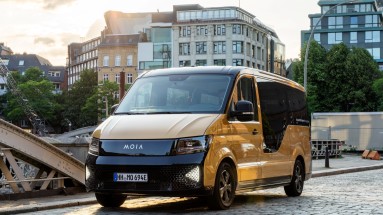Page content
Smart Mobility: Autonomous future for local transport on German roads

Autonomous driving in Hamburg. Image: MOIA
New mobility services such as ride-pooling are designed to drive the transportation transition in urban and rural areas. In Germany, projects such as ALIKE in Hamburg and KIRA in the Rhine-Main area are showing how self-driving cars could revolutionize local public transportation.
Autonomous shuttles could supplement public transportation in Hamburg
The ALIKE project is bringing Hamburg closer to the mobility turnaround. Test operations of autonomous shuttles in the city center will begin in mid-2025. The 37 km² operating area covers one of the most densely populated regions in Germany and offers ideal conditions for testing autonomous driving in real city traffic. Up to 20 fully electric vehicles will be on the road in the city. Passengers can simply book the shuttles via an app. At the same time, a research study is examining the social acceptance of autonomous mobility solutions. The project will run for three years and is funded with 26 million euros by the Federal Ministry of Digital and Transport.
20 shared taxis from the ride-pooling provider MOIA and the Hamburger Hochbahn will be used. The VW subsidiary MOIA relies on the ID. Buzz AD from Volkswagen Commercial Vehicles. The Hochbahn relies on the electrically powered shuttle type HOLON Mover.
Dr. Anjes Tjarks, Hamburg's Senator for Transport, sees autonomous ridepooling as a key to closing the gaps between traditional public transport and private transport. “Even more flexible, even smarter, even more comfortable” is the goal.
Pioneering work in the Rhine-Main area
With the KIRA (AI-based regular service) project, the Rhein-Main-Verkehrsverbund public transport authority is demonstrating that autonomous local transport is not only viable for large cities, but also for smaller towns and rural areas. Since this summer, six autonomous on-demand shuttles have been operating in Darmstadt and the district of Offenbach. Driving behavior, safety and integration into public transport are being tested under real-life conditions. Currently, there is always a safety officer on board. In the future, passengers will also test the autonomous on-demand transport.
At the Smart Country Convention 2024, Thomas Drewes, Head of Autonomous Driving on the Road at Deutsche Bahn, talked about the first 100 days of KIRA. The video in German language can be found here: #SCCON24 | Autonomous driving 100 days of KIRA
The majority would use driverless shuttles for local transport
A recent study by the digital association Bitkom shows that 77 percent of respondents can imagine using an autonomously driving shuttle or minibus. 76 percent would board a self-driving suburban or underground train. Acceptance in long-distance transport looks different: only half of the respondents can imagine boarding a self-driving regional or long-distance train.
The study also shows that autonomous driving offers particularly promising prospects in urban areas.
A glimpse into the future
The willingness to use autonomous means of transport is steadily increasing. According to Bitkom, 61% of Germans believe that in 20 years, a large proportion of vehicles will be driving autonomously. Technologies such as those used in MOIA's ID. Buzz AD, ALIKE or KIRA's on-demand shuttles are already showing how this future is within reach.
Become an exhibitor at #SCCON25
As a driving force for the future of digital administration and for equal digital living and working conditions in cities and rural areas, the Smart Country Convention is a must for all stakeholders who actively advance the digital transformation. Are you interested in advancing the digitization of our cities and municipalities too? Join us and position your company or municipality as an expert in digitalization in the public sector.



